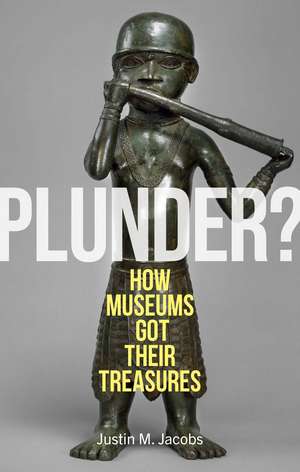Plunder?: How Museums Got Their Treasures
Autor Justin M. Jacobsen Limba Engleză Hardback – 10 oct 2024
In this thought-provoking new work, historian Justin M. Jacobs challenges the widely accepted belief that much of Western museums’ treasures were acquired by imperialist plunder and theft. The account reexamines the allegedly immoral provenance of Western collections, advocating for a nuanced understanding of how artifacts reached Western shores. Jacobs examines the perspectives of Chinese, Egyptian, and other participants in the global antiquities trade over the past two and a half centuries, revealing that Western collectors were often willingly embraced by locals. This collaborative dynamic, largely ignored by contemporary museum critics, unfolds a narrative of hope and promise for a brighter, more equitable future—a compelling reassessment of one of the institutional pillars of the Enlightenment.
Preț: 113.70 lei
Nou
Puncte Express: 171
Preț estimativ în valută:
21.76€ • 22.63$ • 17.96£
21.76€ • 22.63$ • 17.96£
Carte disponibilă
Livrare economică 25 martie-01 aprilie
Livrare express 08-14 martie pentru 27.15 lei
Preluare comenzi: 021 569.72.76
Specificații
ISBN-13: 9781789149487
ISBN-10: 1789149487
Pagini: 240
Ilustrații: 49 halftones
Dimensiuni: 138 x 216 x 28 mm
Greutate: 0.4 kg
Editura: REAKTION BOOKS
Colecția Reaktion Books
ISBN-10: 1789149487
Pagini: 240
Ilustrații: 49 halftones
Dimensiuni: 138 x 216 x 28 mm
Greutate: 0.4 kg
Editura: REAKTION BOOKS
Colecția Reaktion Books
Notă biografică
Justin M. Jacobs is professor of history at American University, Washington, DC. His books include The Compensations of Plunder: How China Lost Its Treasures.
Cuprins
Introduction Chapter 1: Presents and Plunder Chapter 2: Dealers Chapter 3: Excavations and Expeditions Conclusion References Select Bibliography Acknowledgements Photo Acknowledgements Index
Recenzii
"A growing strand of revisionist scholarship . . . sees Western museums as little more than symbols of imperial spoliation. In Plunder? How Museums Got Their Treasures, the historian Jacobs sets out to upend this view. . . . The strength of Jacobs’s . . . polemic is to remind us that the origins of great museum collections cannot be reduced to any one story."
"Jacobs is a historian of antiquities and archaeology who is fed up with 'simplistic bedtime stories' about how museums assembled their collections. He objects to the prevailing discourse that regards Western museums as illegitimate repositories of the spoils of empire. In Plunder?, he shows how that notion is historically inaccurate and imposes a modern ideology—of seeing certain ancient artifacts as priceless national treasures—on people in the past who would have found it alien. Plunder? is a scholarly work, but it is the opposite of dry: Jacobs mounts his argument with verve and a relish in dismantling fashionable dogmas."
"In Plunder? How Museums Got Their Treasure, historian Jacobs walks readers through some of the most well-known—and controversial—instances of cultural exchange in the last 150 years. . . . Dozens of books have been written about modern ownership of antiquities, which have made their way into museums and private collections over the centuries. Many of those books focus on the illicit movement of those artifacts, but Jacobs charts a different course through an often-frenzied discussion about the rightful ownership of ancient things. Using his expertise in cultural exchanges between Chinese authorities and western explorers as a guide, Jacobs suggests that most of what ends up in museums got there through fair exchanges between locals and foreigners. Jacobs problematizes the modern lens through which society sees these turn-of-the-century exchanges."
"Jacobs suggests in his lively and provocative Plunder?, not only is the great part of what’s in our museums not the spoils of colonialist theft, it’s there because at the time that these artefacts made their way into Western collections, through the nineteenth and early twentieth centuries, they did so with the consent of those in charge. . . . His non-judgmental unearthing, via contemporary accounts, of how antiquities were once traded and given rather than plundered, is a riposte to those who believe all museum collections to be illegitimately come by."
"The book, which covers objects ranging from ancient Egyptian antiquities to the Parthenon marbles, challenges the widely accepted assumption that many western museum treasures were acquired by imperialist plunder and theft, arguing for a nuanced understanding of how they reached western shores."
"The ironical question mark of the title of Jacob’s Plunder? is a courageous gesture of defiance against the all-pervading backdrop of postcolonial discourse; his book succinctly demolishes the anachronistic concept that museum artefacts are acquisitions of imperial theft."
"During the past century or so, an unfortunate dichotomy has developed which divides archaeologists, museums and collectors into two camps. One views them as heroic explorers who rescued long-neglected antiquities that were going to rack and ruin, while the other sees them as rapacious foreign devils grabbing whatever pelf they could acquire for financial gain or imperialistic glory. In this meticulously researched and carefully illustrated volume, historian Jacobs adopts a more balanced, neutral stance which takes a whole panoply of factors into consideration. He convincingly demonstrates that there is no single narrative that can account for the multifarious ways in which archaeological materials ended up in lands other than where they originated, or indeed were destroyed inside the very nations where they were created. Plunder?, rightly posed as a question, provides the reader with a whole range of evidence for complicity from all sides involved in the acquisition."
